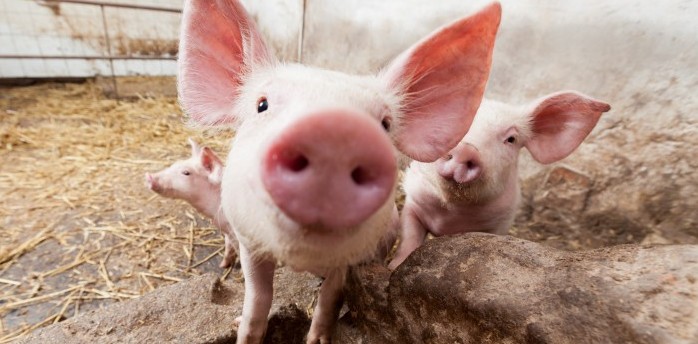Scientists have used gene editing techniques to produce pigs resistant to Porcine Reproductive and Respiratory Syndrome, or PRRS, one of the most damaging pig disease producers face today.
Researchers at the University of Edinburgh’s Roslin Institute, in collaboration with global animal genetics company Genus PLC, used the technology to produce pigs with a specific DNA change. They removed a small section of the CD163 gene, which acts as a receptor for the virus on the surface of pigs’ cells.
They found that none of the animals became ill when exposed to the virus, while blood tests found no trace of the infection – a breakthrough hailed as potentially significant by scientists and pig industry leaders. The animals showed no signs that the change in their DNA has had any other impact on their health or wellbeing.
Previous studies had shown that cells from these animals were resistant to the virus in lab tests, butt this is the first time researchers have exposed these pigs to the virus to see if they become infected.
Other groups have used gene editing to create PRRS-resistant pigs by removing the whole CD163 receptor. Removing only a section of CD163 allows the receptor to retain its ordinary function in the body and reduces the risk of side effects, the researchers say.
PRRS, which causes breathing problems and deaths in young animals and can cause pregnant sows to lose their litter, costs the pig industry around $2.5 billion (£1.75bn) each year in lost revenue in the US and Europe alone. It is endemic in most pig producing countries worldwide, but vaccines have mostly failed to stop the spread of the virus, which the researchers said continues to evolve rapidly.
The research, co-funded by the Biotechnology and Biological Sciences Research Council and Genus, is published in the Journal of Virology.
While the research has obvious potential, there is still a long way to go before PRRS-resistant pigs are available commercially, not least because of uncertainty over the use of gene editing technology in the UK and EU.
Genetically modified animals are banned from the food chain in Europe, but it is not yet clear what regulations would apply to gene-edited animals, however. While GM techniques can involve introducing genes of other species into an animal, gene editing is different as it speeds up processes that could occur naturally through breeding over many generations, without introducing genes from other species.
Dr Christine Tait-Burkard, of the Roslin Institute, said: “These results are exciting but it will still likely be several years before we’re eating bacon sandwiches from PRRS-resistant pigs.
“First and foremost we need broader public discussion on the acceptability of gene-edited meat entering our food chain, to help inform political leaders on how these techniques should be regulated.
“We also need to carry out longer term studies to confirm that these genetic changes do not have any unforeseen adverse effects on the animals.
“If these studies are successful and the public are accepting of this technology, we would then be looking to work with pig breeding companies to integrate these gene edits into commercial breeding stocks.”
Professor Alan Archibald said: “Gene editing gives us a powerful tool to help reduce losses in the farming industry while improving the health and welfare of the animals themselves.”
Jonathan Lightner, Chief Scientific Officer for Genus PLC said: “These results are very exciting and further underscore the potential, through gene editing, to provide incredible benefits to the global pork industry, and society as a whole, by improving animal health. We look forward to further collaboration with the University on this exciting project.”
NPA senior policy advisor Georgina Crayford described it as ‘potentially a hugely significant breakthrough’.
“If the researchers developing PRRS-resistant pigs are able to demonstrate that the gene editing technique has no adverse effects on the pigs and poses no danger to human health, we could be looking at an exciting and revolutionary solution to the serious problem of PRRS,” she said.
“Preventing pigs from succumbing to the PRRS virus would not only hugely improve pig health and welfare, it would also help the industry further reduce its use of antibiotics, which in turn would help limit development of AMR and protect public health.”




